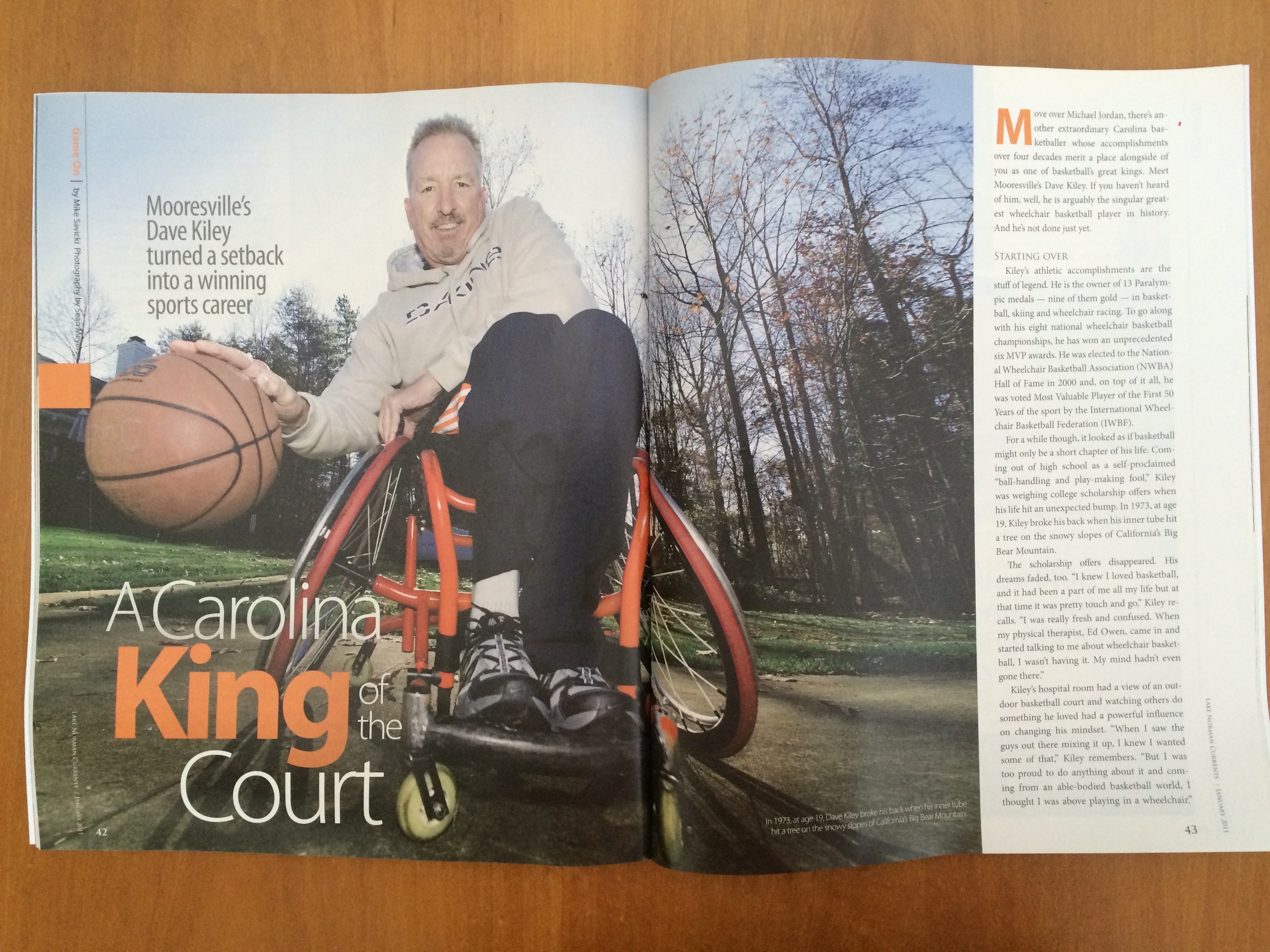A Carolina King of the Court
By Mike Savicki
Move over Michael Jordan, there is another extraordinary Carolina basketballer whose accomplishments over four decades merit a place alongside you as one of basketball’s great kings. Michael, meet Mooresville’s Dave Kiley. If you haven’t heard of him, well, he is arguably the singular greatest wheelchair basketball player in history. And he’s not done just yet.
Dave Kiley’s athletic accomplishments are the stuff of legend. He is the owner of 13 Paralympic medals – nine of them gold – in basketball, skiing and wheelchair racing. To go along with his eight national wheelchair basketball championships, he has won an unprecedented six MVP awards. He was elected to the National Wheelchair Basketball Association (NWBA) Hall of Fame in 2000 and, on top of it all, he was voted Most Valuable Player of the First 50 Years of the sport by the International Wheelchair Basketball Federation (IWBF).
For a while though, it looked as if basketball might only be a short chapter of his life. Coming out of high school as a self-proclaimed “ball-handling and play-making fool,” Kiley was weighing college scholarship offers when his life hit an unexpected bump. In 1973, at age 19, Dave Kiley broke his back when his inner tube hit a tree on the snowy slopes of California’s Big Bear Mountain.
The scholarship offers disappeared. His dreams faded, too. “I knew I loved basketball and it had been a part of me all my life, but at that time it was pretty touch and go,” Dave Kiley recalls. “I was really fresh and confused. When my physical therapist, Ed Owen, came in and started talking to me about wheelchair basketball, I wasn’t having it. My mind hadn’t even gone there.”
Kiley’s hospital room had a view of an outdoor basketball court and watching others do something he loved had a powerful influence on changing his mindset. “When I saw the guys out there mixing it up, I knew I wanted some of that,” Kiley shares. “But I was too proud to do anything about it, and coming from an able bodied basketball world, I thought I was above playing in a wheelchair.”
But when the other patients left the hospital with weekend home passes, Dave Kiley found his way onto the court. He continues, “I was still too newly hurt to leave the hospital, but when everybody went home for the weekends I would sneak out on the court when no one could see me.”
Dave Kiley relearned the game quickly and became a standout on the national scene. He says, “I turned twenty about three months after I was hurt, and by the time I was twenty-one I made my fist national team. I had never traveled anywhere before, and in that first year alone, I went to the World Championship in Bruges and the Stoke Mandeville Games outside of London. I came home for a few days then went to the Pan American Games in Mexico City. After my three-country-tour right out of the gate, I was hooked and all I wanted to do was make more teams and travel.”
For the next two decades, Dave Kiley rolled at the top of the wheelchair sports world. He anchored some of the most dominant teams in wheelchair basketball history and traveled to dozens of countries, collecting more medals than almost any other basketball athlete in history. At the same time, after Casa Colina Rehabilitation Center in Pomona, California, came calling, Kiley directed and grew the first community-based wheelchair sports program in the country.
In 1996, Kiley relocated his family to establish a multi-faceted adaptive sports program in Charlotte. “I fell in love with Charlotte in the matter of a half a day,” he recalls, “and quickly learned how popular basketball is here in North Carolina.”
Now retired from playing after 35 seasons, Kiley’s new focus is on coaching. He faces a new set of challenges as a coach. “The big challenge is that many great former players don’t necessarily make great coaches,” he explains. “So I have had to really become a student of something I thought I knew everything about. It’s totally different being a great player versus a great coach. I’m not even close to being a great coach and that’s what I’m chasing right now.”
The Charlotte Junior Rollin’ Bobcats are already national champions thanks to his leadership. “When we first started a few years ago, we had to take Nerf balls and small baskets to games and ask the other team if we could use them because our kids were so small. Now we have kids who are driving, dating and getting recruited to college with athletic scholarships,” Kiley recalls.
And he is also a national team coach who is bringing his love of the Carolina outdoors to the basketball scene. In June 2010, coach Kiley brought his USA Women’s National Team to Lake Norman for their last training camp prior to competing in the World Championships in England. While most camps run three intensive sessions a day, coach Kiley changed the schedule to take advantage of the surroundings. “I was more about using the lake as a way to bond in the evenings and become a family than about sticking to tradition,” he explains. “We had two sessions a day and then I had them out on the lake. We had a fish fry and bonded in the back yard.”
His strategy worked to perfection. “The women’s team hadn’t won in 24 years. That’s six different World Championships they either came home with a silver, bronze or no medal at all. We wouldn’t have won gold were it not for our last camp at the lake.”
So, Michael, are you ready to share your Carolina basketball throne? Dave Kiley deserves a seat. Because when you are Dave Kiley, your basketball kingdom begins in your Carolina back yard and it knows no boundaries.
This article was originally published in the January 2011 edition of Currents Magazine.

